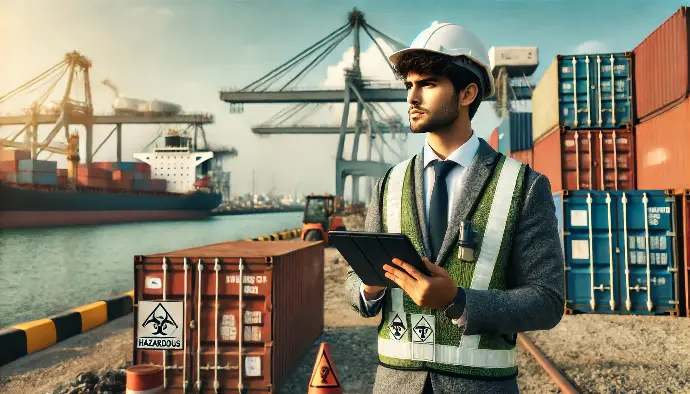Overview
Managing the import and export of hazardous wastes in India is a critical aspect of environmental protection. The Ministry of Environment, Forest and Climate Change (MoEFCC) regulates this process under the Hazardous and Other Wastes (Management and Transboundary Movement) Rules, 2016 and 2022 amendments. These regulations align with international conventions such as the Basel Convention, ensuring safe and environmentally sound management of hazardous wastes.
The compliance process involves obtaining necessary approvals, adhering to strict documentation requirements, and ensuring all activities related to hazardous waste import and export meet the legal norms. This framework aims to prevent environmental contamination, protect human health, and promote sustainable waste management practices.
List of Waste that can be Imported or Exported from India
- Lead Scrap/Battery Scrap: Requires detailed justification and compliance with pollution control norms.
- Waste Tyres/Rubber Scrap: Must include process flow charts and environmental consents.
- Electrical and Electronic Assemblies (EEAs)/Equipment (EEEs): For repair, refurbishment, or reuse with specified timelines for re-export.
- Used EEAs/EEEs for Testing or R&D: Requires Chartered Engineer certification and detailed import/export records.
- High-End Medical Equipment: Must be refurbished and have a minimum residual life.
Stakeholders
Industries and Manufacturers: Entities that generate, use, or manage hazardous wastes.
- Waste Management Companies: Firms involved in recycling, treatment, and disposal of hazardous wastes.
- Mercury Traders and Distributors: Companies dealing with the trade of mercury.
- Government Agencies: MoEFCC, SPCBs, and CPCB overseeing compliance and regulation.
- End-Users: Entities using imported hazardous wastes in their processes.
Compliance Requirements
- Authorization from MoEFCC: Mandatory for all importers and exporters of hazardous waste.
- Environmental Consents: Valid Consent to Operate and Consent to Establish under the Water and Air Acts.
- Prior Informed Consent (PIC): Required for mercury and other hazardous chemicals as per the Minamata and Rotterdam Conventions.
- Documentation: Detailed application forms (Form 5, Form-X, etc.), justification for import/export, and affidavits for liabilities.
- EPR Registration: For products covered under Extended Producer Responsibility regulations.
How to Comply
Steps to Comply with Waste Import-Export Regulations
- Identify Waste Category: Determine the specific type of hazardous waste and its regulatory requirements.
- Prepare Documentation: Complete all required forms, including Form 5 and Form-X, and gather supporting documents such as environmental consents and liability affidavits.
- Submit Application: Submit the application to the MoEFCC and relevant SPCBs. Use the NSWS portal for digital submissions.
- Coordinate with SPCBs: Ensure acknowledgment and coordination with State Pollution Control Boards for compliance verification.
- Review and Approval: Respond to any queries from the MoEFCC and ensure all conditions are met for approval.
Time Limits and Due Dates
- Application Processing: Typically 60 to 90 days for the MoEFCC to process applications.
- Submission Deadlines: Ensure timely submission of applications and renewals to avoid penalties.
- Annual Reporting: Regular updates and reporting as per the stipulated guidelines.
FAQs
The import and export of hazardous wastes in
India are governed by the Hazardous and Other Wastes (Management and
Transboundary Movement) Rules, 2016. These rules ensure compliance with
international conventions such as the Basel, Rotterdam, Stockholm, and Minamata
Conventions.
Industries generating hazardous wastes,
importers, exporters, waste treatment facilities, and authorized recyclers must
obtain approval from the Ministry of Environment, Forest, and Climate Change
(MoEF&CC) before engaging in the import or export of hazardous wastes.
Applications for hazardous waste import/export
approval can be submitted online through the MoEF&CC portal or offline by
submitting physical documents to the Hazardous Substances Management Division
(HSMD).
The required documents include a completed
application form, environmental clearance certificates, a waste management
plan, proof of compliance with international conventions, and financial
assurance.
The fees for hazardous waste import/export
approval vary based on the type and quantity of waste. The specific fee
structure is outlined by the MoEF&CC and must be paid during application
submission.
The processing time for obtaining approval for
hazardous waste import/export is typically around 60 days from the date of
application submission.
If your application is denied, the HSMD will
inform you of the deficiencies. You will need to address these issues and
resubmit your application for reconsideration.
Yes, importers must demonstrate their
capability to manage and dispose of hazardous wastes in an environmentally
sound manner, in compliance with the Basel Convention and other relevant
regulations.
Hazardous wastes can only be exported to
countries that have the infrastructure and regulations in place to manage and
dispose of these wastes safely, in compliance with the Rotterdam Convention and
other international agreements.
The Ministry of Environment, Forest, and
Climate Change (MoEF&CC), specifically the Hazardous Substances Management
Division (HSMD), is the primary authority responsible for hazardous waste
management, including the import and export of hazardous wastes.

